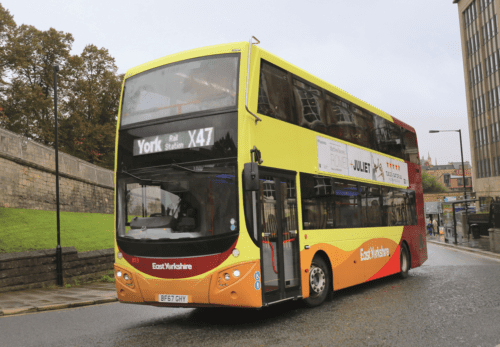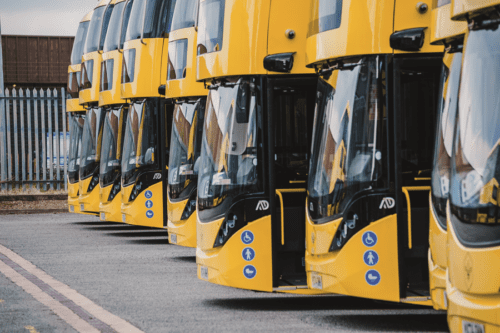
The new Government has decided to keep a bus fare cap in England after the end of the current £2 scheme in December, but the cap will rise to £3
The fare cap for single bus fares in England will be raised to £3, Prime Minister Sir Keir Starmer and Chancellor Rachel Reeves have announced, replacing the existing £2 maximum which was introduced under the previous Government to help with the cost of living, initially as a short term measure.
The existing cap was due to expire at the end of December, and the new cap will take its place from January on services provided by operators which have opted to take part. It will remain in place until December 2025.
Sir Keir said: “I do know how much this matters, particularly in rural communities where there is heavy reliance on buses.”
However, Transport for London single fares will remain capped at £1.75 and those in Greater Manchester at £2, whilst campaigners in West Yorkshire called on the region’s Mayor to keep single bus fares capped at £2 despite the national rise. Campaign group Better Buses for West Yorkshire said any rise would hit the poorest people the hardest and called on Mayor Tracy Brabin to follow Mayor of Greater Manchester in continuing the cap in 2025.
In a statement, the Mayor said she was committed to keeping fares as low and affordable as possible. West Yorkshire was the first area in England to introduce a £2 fare cap in September 2022, with the national government following suit in January 2023.
“In West Yorkshire, our £2 Mayor’s Fares scheme has proven a huge success by increasing bus patronage and helping people manage the cost of living crisis, since it was introduced in September 2022,” the Mayor said. “We are committed to building on this success and keeping fares as low and affordable as possible in West Yorkshire. The Government is setting out a new national scheme to cap bus fares next year, and we will respond in the coming days about what this means for passengers in our region.”
Industry response
The move responds to concerns raised by trade bodies such as the Confederation of Passenger Transport, which had said that removing the cap altogether could mean some passengers facing a ‘cliff edge’ at the end of the year when normal fares would have resumed.
Responding to the announcement, Nottingham City Transport said: “Bus operators have not yet been provided with details about how the new fare cap scheme will operate, but the new £3 single fare cap is the price a City Zone single would have been if there had not been the current £2 fare cap in place.”
The operator pointed out that despite the cap, its fares had risen twice since the cap was introduced as a result of double digit inflation. “The City Zone single would have increased to £2.80 in May 2023 and to £3 in March 2024, but did not because of the government funding for the £2 fare cap,” the company said. “Customers who make 2 journeys a day in the City Zone can minimise the impact of the changes to the national bus fare cap by switching to a £5.30 all day ticket, which is 70p cheaper than two single fares under the
new £3 fare cap.”
The Association of Local Bus Managers, ALBUM, said it is “pleased that there is now more clarity concerning the fare cap scheme, at least for the 14 months until the end of December 2025, which helps customers and bus operators alike. Retention of the scheme, albeit at a higher price point, will help preserve the growth in the use of many rural and inter-urban bus services that the fare cap scheme has generated during the last 22 months. This benefits rural bus users, local economies, and SME bus operators providing bus services in rural and inter-urban areas.”
Brighton & Hove Buses said: “Our buses play an important role in connecting our communities, supporting workplaces, and enabling economic growth. We are pleased to hear in the pre-budget announcement that the scheme will continue under the new Government.”

Bus funding
The cap is being funded by £151 million from Government until the end of 2025, and comes alongside confirmation from the Department for Transport of an additional £925 million promised for the 2025 to 2026 financial year to improve bus services across the country. The money will be available to local authorities to introduce new bus routes, make services more frequent and protect bus routes, whilst the Government says that moving forward, it will also explore more targeted options that deliver value for money to the taxpayer to ensure affordable bus travel is always available for people who need it the most, such as young people.
Transport Secretary Louise Haigh said: ”Buses are the engines of economic opportunity across the country. We know that reliable, affordable bus services are vital to keeping Britain moving. That’s why the Government will cap fares at £3 for an additional year and provide over £1 billion to deliver better bus services.
“This will avoid a cliff-edge at the end of this year and keep fares affordable across the country – improving access to opportunities, particularly in towns and rural areas, while offering value for the taxpayer. Our bus revolution will give every community the power to take back control of their services, end the postcode lottery of services and turn the page on four decades of failed deregulation.”
The announcements come ahead of the new Buses Bill, to be introduced later this parliamentary session, which the Government says will help bring an end to what it calls ‘the current postcode lottery’ of bus services by ‘empowering local authorities to deliver modern and integrated bus networks that put passengers at the heart of local decision making.’
Welcomed
Director at independent watchdog Transport Focus David Sidebottom said: “We know that bus passengers want simpler, better value for money fares and buses provide a lifeline for so many people up and down the country. Our research shows the fare cap is having a big impact in helping more people get around by bus. We welcome the wider investment in services, and the announcement of a new £3 cap on bus fares will provide certainty for many people who are struggling and worried about the cost of travel.”
Reacting to the Chancellor’s statement, Alison Edwards, Director of Policy and External Relations at the Confederation of Passenger Transport, said: “Buses are the UK’s most popular and affordable form of public transport, carrying over 10 million people a day. We welcome the Government’s ambition of improving buses nationwide and this week’s package of £1 billion in public funding for buses will safeguard vital routes and ensure that fares across England are capped at £3. However, our industry is a major employer in towns and cities across the UK, responsible for more than 150,000 jobs. The Chancellor’s increase in national insurance contributions will weigh heavily on bus and coach operators, typically costing £800 a year for each driver.
“This big tax rise will weaken the ability of bus operators to invest in higher frequencies, new routes and modern, environmentally friendly vehicles. And it will hurt coach operators, many of which are small, family owned businesses.
“Aside from this, we welcome the Government’s decision to freeze fuel duty. Extra money to fix potholes will give our passengers smoother journeys. And the prospect of additional funding for hydrogen transport, and zero-emission vehicles, is a positive as long as buses and coaches are included.
“Of every £10 spent on Britain’s high streets, a pound is spent by bus passengers – contributing almost £40 billion a year to local economies. Long distance coaches, meanwhile, carry visitors who spend £8.3 billion annually in towns, cities and tourist destinations. Collectively, the bus and coach sector is vital in achieving the Government’s missions of kick-starting economic growth and breaking down barriers to opportunity. However, contradictory policies which, on the one hand, support public transport and on the other hand impose substantial extra costs, are unhelpful.”

